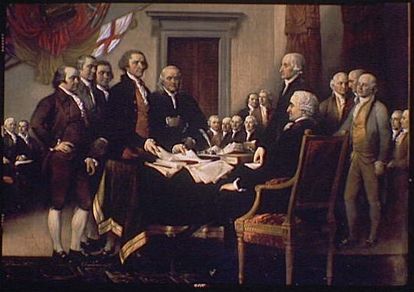 The Signing of the Declaration of Independence The Signing of the Declaration of Independence We live in perilous times. The election continues to be contentious. The world seems to be falling apart as the Middle East spirals further and further into war. Refugees are forced from their homes. Terror attacks are ravaging the cities of Europe. It's enough to drive you crazy if you dwell on it enough. But our recent Virginia trip has had me thinking about a particular line from our history. As the Americans, from different philosophies, stood together in defense of the rights guaranteed to them, they decided to craft a document and Thomas Jefferson closed it like this: "And for the support of this Declaration, with a firm reliance on the protection of divine Providence, we mutually pledge to each other our Lives, our Fortunes and our sacred Honor." Looking at that line a few things stand out to me. First of all, "deists" don't rely on "the protection of divine Providence." It sort of goes contrary to their whole idea of faith. These were largely men of faith who were placing their hope in that faith to get them through trying times. They were believing that they were doing the right thing and that the hand of The Almighty was going to favor their action. They realized that there was no human or scientifically explainable way for them to accomplish what they were setting out to do. Second of all, they pledged to each other. They put hope in each other. They knew that a fractured and divided movement would never succeed. There was a need to depend on each other. We like to pretend that all the Founding Fathers always got along, that they were all good friends and were of one mindset. But history teaches us something very different. These men got past their differences to advance the cause and place their great experiment in motion. They put their trust in their rivals. Third they pledged to each other their lives, their fortunes, and their sacred honor. Several of these men never lived to see Yorktown. Many who lived to see victory had lost every possession they had. The only thing these men would have at the end of the war would be that sacred honor. Honor is not something we talk much about any more. it is not uncommon to have candidates, or even elected officials, who lie, cheat, and steal. They do whatever advances their personal agenda and gives them power. And then we have those who drag the names of our national heroes into the mud, judge them by the morals of our day and advance a cause that says they weren't great men. This makes many feel better about electing scumbags today. Perhaps it even makes them feel better about themselves. It's far easier to drag down the exalted than it is to pull themselves up by their own bootstraps. We can be better than that. We're not at the moment, but we can be. Our current electoral mess is a reflection of the people we are as a nation. If we pledged our sacred honor, we wouldn't have enough on the line to buy a pack of gum at a mini-mart. What do we have to do? I'd say that if we are going to claim to be people of faith, we have to grab it and run with it. That is going to have to be a personal thing. We can't just claim it when it disagrees with those we disagree with. It has to be a commitment that governs how we live, the decisions we make for ourselves and our families, and how we treat people. We have to judge a tree by it's fruit while not demanding that pear trees produce oranges. When pear trees gorw pears we have to understand that's what pear trees do. We have to change the way we converse in this country. Politics have always been contentious but we have a unique problem. 1) We have two major candidates that don't have enough honor between them to flap a flag in a hurricane. Their dishonor has required so much of the conversation we've had no time to discuss the important issues that our nation is facing. It's been an entire season of mud slinging and we're the ones getting soiled. And 2) We have to change the way we discuss the issues with each other. Personal attacks, name calling, mud slinging, muckraking, and threats don't fix our problems. We need intellectual debate of the issues. But most of all, we have to reclaim the idea of sacred honor. We have to be honest. We have to be people of our word. We have to recover the idea that these things matter. We have to expect honor of ourselves first and then we have to expect it from our leaders. We have to be the kind of people that we expect to have leading us because that's how self-government works. By putting their sacred honor on the line, our Founding Fathers were saying that they could be wrong, that the whole thing could blow up in their face leaving them looking like wayward, rebellious fools. It could make their name and their word worthless. They understood the risk. That risk is now ours. It's the risk a free people on a mission of self-government. We have to rise to the occasion. America can only be as good as the people tasked with governing it. Under our system, that's all of us. Our fortunes can be lost, our lives can be taken, but we must work to make our sacred honor secure. we have to expect better of ourselves, place our trust in others to do the same and put our country in a position to deserve better than we are getting this year. Then, and only then, can we expect our situation to improve. I'm pledging to you to work on me. I'm trusting you to work on you.
0 Comments
By Sam Burnham @C_SamBurnham 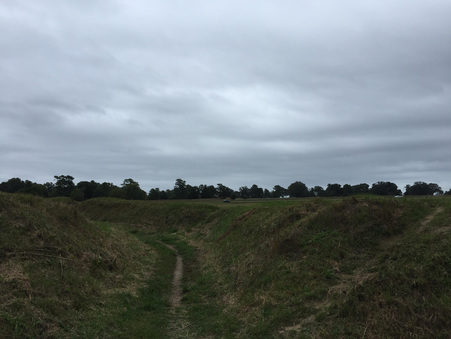 Inside a Parallel, Facing the British Headquarters Inside a Parallel, Facing the British Headquarters On October 19, 1791, exactly 235 years ago today, British General Cornwallis signed the document of capitulation at Yorktown, Virginia. That effectively put an end to the American Revolution and secured Independence for the United States. The surrender ended the Siege of Yorktown, a military action in which allied American and French forces under the command of Generals George Washington and Compte de Rochambeau pinned the British against the banks of the York River and then used artillery to shell them into submission. 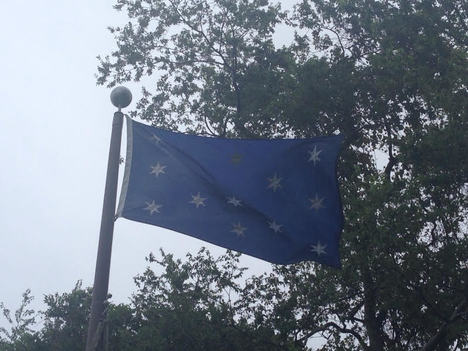 The Flag of Washington's Army The Flag of Washington's Army The Allies created a perfect storm. The brilliant young Frenchman, Major General Marquis de Lafayette, had pursued Cornwallis onto the Virginia Peninsula as the British force was attempting to escape to fight another day. Washington heard of this development in New York and recognized an opportunity to put an end to the war. Feigning a siege if New York, he sneaked his army to the south before British commander Sir Henry Clinton could do anything about it. What followed was one of those legendary American marches that we've seen turn the tide in wars. When an entire division, or even an entire army just gets up and relocates over an "impossible" distance in an "impossible" amount of time - the "we have to do this right now" American feat of military mobility. Washington's army marched from New York to Virginia in time to trap the British. While the French fleet arrived just in time and clobbered the British naval force sent to rescue the Redcoats, Cornwallis went from facing off against the 24-year-old Lafayette to being outnumbered 2-to-1 and trying to also outwit Washington, Rochambeau, Henry Knox, and Baron von Steuben. And let's be honest, he wasn't trapped on a peninsula awaiting evacuation because he was handling Lafayette. 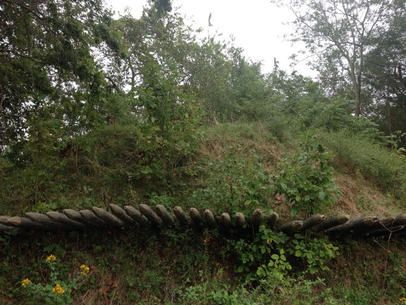 Redoubt 10, on the Banks of the York River Redoubt 10, on the Banks of the York River Parallels, trenches, were dug across the battlefield. Yorktown was not a traditional battle in terms of infantry lining off and firing while trying to outflank each other or break the lines of fire. Yorktown was a siege. The Allies dug trenches to put artillery in and shelled the British. When the Redcoats fell back, the Allies built a closer trench. The second trench's completion was dependent on the capture of two British redoubts - earthen mini-forts protected by armed Redcoats and abatis. The French took Redoubt 9 and the Americans captured Redoubt 10. The taking of Redoubt 10 is another legendary American military feat. It guaranteed the completion of the second parallel and effectively sealed Cornwallis' fate. (As well as provided one of the few positives you'll ever hear me utter about Alexander Hamilton.) 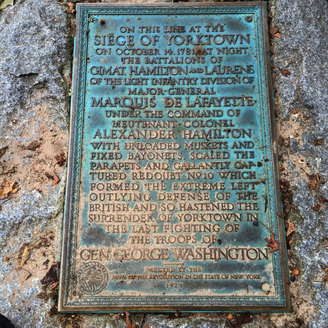 The Monument at Redoubt 10 The Monument at Redoubt 10 To take the position, Alexander Hamilton led light infantry armed with unloaded muskets, to avoid having an accidental discharge tip off the British, on a head-on bayonet charge. They went up the slopes, through the abatis, over the top and quickly subdued the British forces inside. Once artillery batteries were put in place, Cornwallis was done. Washington signed the ceasefire document at Redoubt 10 and the two sides sent representatives to discuss surrender. Capitulation was finalized on the 19th. 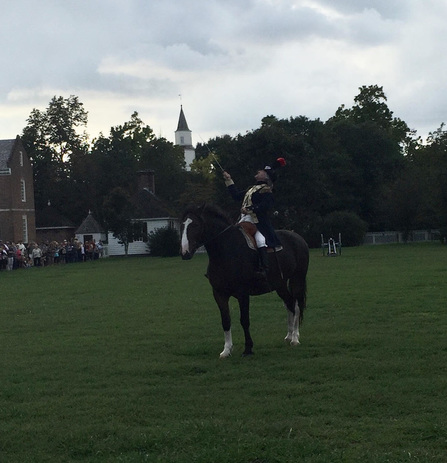 A Living Historian Depicting Lafayette at Williamsburg A Living Historian Depicting Lafayette at Williamsburg One of my favorite stories from Yorktown, probably one of the most American things to happen there, was about the song Yankee Doodle. The British had made the song as an insult to the Americans. The song is a depiction of a stupid and naive American who foolishly thought he could be the 18th century equivalent of a trendy hipster, much less a true gentleman. Lafayette, a fascinating man who deserves his own story here, gave us one of the earliest 'Merica moments. Instead of one of their typical marches, Lafayette ordered his band to play Yankee Doodle. At the surrender ceremony. In front of the defeated and embarrassed British Army. The cocky Frenchman slapped the British with the truth that they didn't just lose and lose badly, they lost the Yankee Doodle.
By Sam Burnham @C_SamBurnham 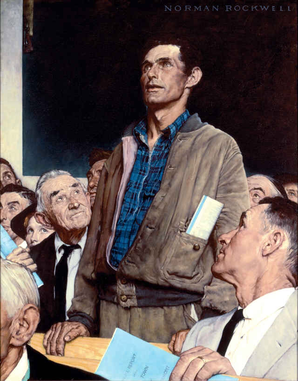 Norman Rockwell's "Freedom of Speech" Norman Rockwell's "Freedom of Speech" Let's face it, you're tired of this election cycle. I know this because you're human and, in all likelihood, not running for president. Since I fit those categories and I'm tired of it, I'm assuming that you are too. There's not much we can do about the state of American politics this year. It's pretty much a cesspool fire that just really can't get much more disgusting. While we can't really do anything about this year, we can try to do a few things to keep something like this from happening again. The Presidency has become such a powerful position that unsavory people with insatiable lusts for power and prestige are drawn to it like flies to...well...you know. Every four years we find ourselves choosing the lesser of evils to try to keep the worst of evils from winning. We've just finally reached the point where the evils have become unbearable and there's no honest hope that anything will improve in the 2020 election. So it's time to try something different. Which brings us to the Norman Rockwell painting. Painted in the 1940s, it depicts Freedom of Speech. We see a man, from his clothes and his hands a working class man standing in the company of his neighbors and other members of his community. The other community members appear to come from different backgrounds. Men in coats and ties are watching and listening. The man appears to be addressing the town council or perhaps the local school board. Whichever body it is, it's safe to assume they are elected representatives that are listening to the advice and concerns of the electorate. In this case the electorate is present to address the government in person. There's no need for calls the elected will never hear or emails they'll never read. The concerns of the people are front and center. They are, in fact, the very reason for the meeting. The decisions aren't being made in some far distant fortress of apathy in which disconnected lawmakers decide matters for people they'll never meet, never listen to, never care about. We've assembled far too much power in far distant places. We have no access to our government. We need decisions that are made closer to home by people who truly understand the unique issues that our state and our communities face. The idea of treating a vast and diverse nation as there's on solution to every problem is silly. What works in Georgia might not work in Oregon. And what works in Johns Creek might not work in Waycross. There are issues to deal with at the federal level. They are limited and specifically enumerated in the Constitution. There are issues that are reserved for the states. And there are issues in which an informed and concerned electorate of men in coats and ties and men in flannel with calloused hands (and ladies) need to stand, present their cases to a council made up of their neighbors, and be heard. This is government of, by, and for the people. This is government that can't ever exist in Washington. We have to make decisions and govern closer to home. Government must become more local. This is is the answer to the 2016 problem. |
Sam B.Historian, self-proclaimed gentleman, agrarian-at-heart, & curator extraordinaire Social MediaCategories
All
Archives
November 2022
|
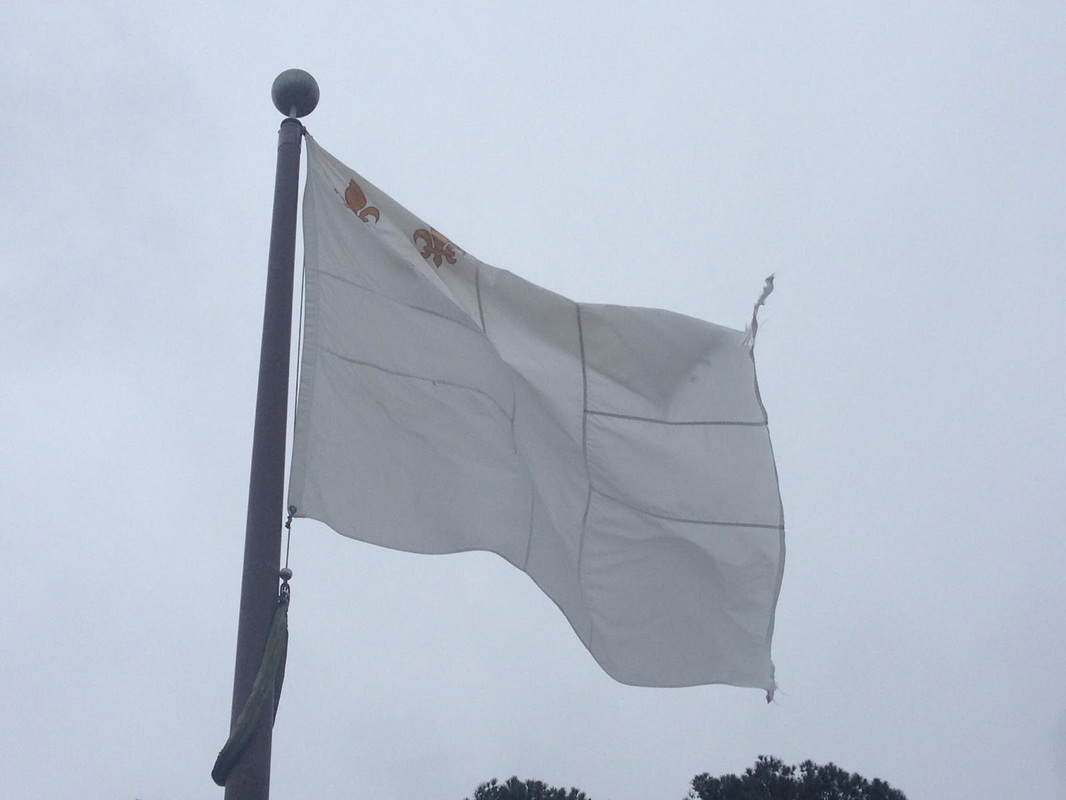
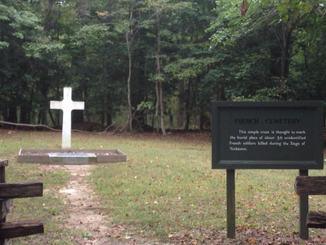
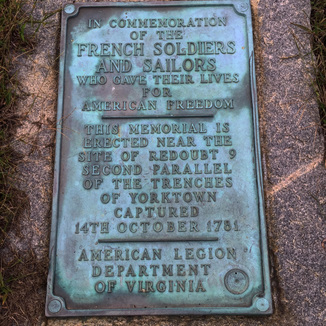




 RSS Feed
RSS Feed
